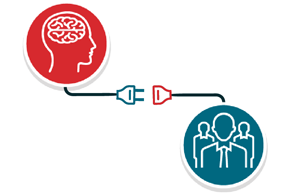We’ve all been there. We’ve dealt with difficult customers in our jobs—sometimes daily. So many issues abound with managing difficult clients, Key Opinion Leaders (KOLs), speakers, and advisors. After all, these are some of the smartest and most accomplished individuals on the planet! In my experience, while most are absolutely wonderful, others aren’t so easy. This topic warrants a discussion to help us deal with difficult KOLs.
We don’t need to be reminded that scientists are people too, but it’s easy to forget. They have bad days, difficult relationships, unexpected outcomes with patients, and many other issues that go along with being human. Healthcare professionals (HCPs) aren’t gods—and I don’t believe I’ve ever met one who wants to be treated that way. I have, however, worked with individuals who are demanding, demeaning, egotistical, and uninterested in improving their skills. Ultimately, like all of us, they want to be treated with respect. When we respect one another, we typically get good results. However, we’ve all been in positions where we feel like respect no longer matters and we are dealing with individuals unable to be respectful, so we need to get ahold of the situation before it gets ahold of us. Dr. Paul Marciano—known as the Respect Guru and author of Carrots and Sticks Don’t Work agreed. He added, “Many leaders assume that respect should be automatically bestowed upon them based on their position and achievements, but in truth, leaders must treat those around them with respect every day. Unfortunately, many great KOLs not only underestimate the importance of showing respect, but also remain ignorant of their behavior and its negative impact on others.”
While this is never an easy position, time and experience has shown me that there are ways to help mitigate the negativity by taking control of ourselves. After all, it’s much easier to ask yourself: why can’t the other person change? But that’s not going to happen. Let’s instead look at 7 tips to help us personally control our own thoughts and actions when working with difficult customers.

1. Keep your cool.
You’ve been successful working in healthcare—and, like so many of your customers—you are highly conscientious. When you’re attacked, you can take it personally. Instead of letting someone else take you in a negative direction with an email, keep your cool, take a deep breath, and avoid too quick a response. For me, this doesn’t always do the trick, so I give it some time before responding to the issue and aim to work it out the next day. It just takes one curt email or snarky text response to negatively impact a professional relationship that you’ve had for a long period of time.
2. Realize that they might be suffering and listen with patience.
Empathy not only helps your difficult customer feel like you’re listening, but it is a powerful tool for your own state of mind. Everyone wants to be heard, so take the time to listen to what the person has to say. Once you have a better understanding of where they’re coming from, you will be better able to focus on a solution. When we see a successful HCP, we often make assumptions that they have the perfect life. Instead, realize that they could be personally suffering with a loss of a loved one, they may have a difficult boss themselves, or they may even have a fear of not getting everything that they need to get done at that moment. Understand that something deeper may be the trigger.
3. Shift from being reactive to being proactive.
Force yourself to come up with more than one way of thinking about a negative situation. Let’s say a KOL isn’t responding to my emails about a program. I can either think, “What a jerk for not responding,” or I can say to myself, “Wow, she must be in very high demand, so let me try to call her instead.” If a KOL is demanding about the exact color of a line graph on a slide, I can either think, “He is really demanding,” or shift my thinking to, “His experience has shown him that small things can make a big difference—and that’s why he’s successful.” Adjusting our mindset is not easy and requires practice, but this shift will turn your reactivity into proactivity. At the same time, realize that empathetic statements don’t excuse bad behavior. Professionals may choose to act poorly because of their own issues. By depersonalizing, we can see the situation more objectively and come up with better ways for problem-solving.
4. Separate the person from the issue.
Doesn’t it usually seem to be the same squeaky wheels? So often in our profession we see the same KOL with another complaint. “Oh, here they go again!” This bias has affected me personally. When I received a call from a KOL who had recently canceled his participation in a program, I didn’t listen well and assumed that he just wanted to cancel his involvement in a different national broadcast program. In reality, his complaint had nothing to do with canceling. In fact, he felt that his time for preparation was too short and really just wanted reassurance that he was going to have the time and coaching he required to excel. I didn’t listen well because I had an internal bias.
5. Disarm with humor.
Appropriate humor can disarm unreasonable behaviors in professional situations. It can show your detachment from someone’s behavior and help you to not react to them. Humor works in miraculous ways as it changes the way that others feel in that moment. It can open their eyes to their own behavior in a particular situation. Recently I was dealing with a demanding speaker who was not happy about hearing feedback on an important program, but my job was to ensure that the program was well received so I needed to provide her with relevant feedback. As she glared at me when I asked her to shift the way she responded to certain questions, I added levity by asking her to pretend that she was Dana Carvey acting as John McLaughlin when he interviewed Pat Buchanan on Saturday Night Live—do the same thing and have fun with it and host a similar lightning round. In the end, she took the coaching and did a great job. Making her smile got her to make the adjustment in a way that wasn’t threatening.
6. Concentrate on Problem-Solving.
In general, difficult KOLs like to be in control. They like things a certain way. This can really lead to a negative tone. You can interrupt this behavior by changing the topic and focusing back on the big picture. In our profession, the big picture is always the patient. Ask the question, “How does this ultimately have an impact on improving the education on behalf of patients?” That change in conversation puts you back in control, creates perspective, and converts you from following to leading.
7. Confront Bullies.
Sometimes it’s time to accept that you have nothing to lose and that ending a relationship is an acceptable outcome. This is the time when we can confront the difficult KOL with the knowledge that it could lead to a severed relationship. You owe it to yourself and your colleagues to function in a positive environment. A negative environment doesn’t do you any good, and a positive one can transform your life for the better almost instantaneously. There’s honestly no excuse to exist within a negative environment filled with difficult people. Sometimes ending the relationship is better for both you and the difficult KOL. When it gets to this point, there’s obviously been quite a bit of past contentiousness, so keep the conversation focused on your needs and what is best for your business. Avoid making “you” statements. For example, “I appreciate the value you’ve brought to us over the years, but my business is changing and requires that I make some shifts with the advocates we utilize.” That type of language will make it less personal and help you to walk away with greater success.
In the end, treating each other with respect is the core of what works with most professionals, and KOLs are no different. On the rare occasion you have to work with someone who at first seems impossible, you will know what to do. Most KOLs are incredibly talented people who just want to be successful—just like you.





